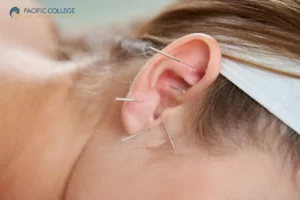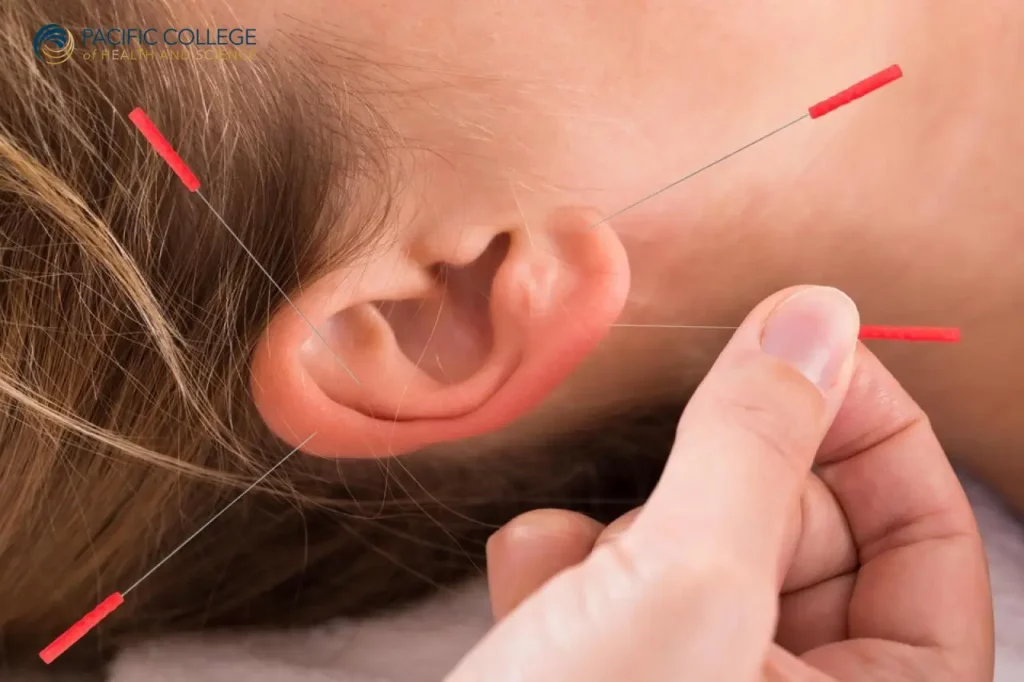Auricular acupuncture is a popular modality that involves needling specific ear acupuncture points. It can have positive effects ranging from stress reduction to pain management and address various issues both physical and emotional. Also known as auricular therapy or auriculotherapy, the practitioner places extremely thin auricular acupuncture needles in specific ear points that map on to other organs or areas of the body, thus relaying signals to the brain and nervous system and then the intended organs or areas.
The Science Behind Auricular Acupuncture
Auricular acupuncture was popularized for the modern audience by Dr. Paul Nogier in the 1950s, who adapted it from ancient Chinese texts, and further popularized in the 1970s by the National Acupuncture Detox Association (NADA) as part of a broader social justice movement. In Nogier’s interpretation, he described points on the ear that represent a “micro-map” of the overall body. These points connect through the nervous system to the brain’s somatosensory cortex, which processes signals from the body. By stimulating specific points on the ear, practitioners can influence the corresponding organs and systems through the release of endorphins and other neurotransmitters.
Are you interested in becoming a certified acupuncture professional?
Visit the links below to explore our specialized acupuncture programs at a campus near you:
Ear Acupuncture Benefits
Acupuncture of the ear can include a wide array of potential benefits, of which some of the more common are:
- Pain relief: auriculotherapy benefits those with chronic and acute pain in part by releasing endorphins, the body’s natural painkillers.
- Stress and anxiety reduction: some of the effectiveness of using ear acupuncture for anxiety lies in its stimulation of the sympathetic nervous system, which helps regulate stress and reduce anxiety by promoting relaxation.
- Reduction in addiction and cravings: known for assisting in smoking cessation and addiction recovery, ear acupuncture for addiction can help reduce cravings by influencing brain areas related to reward and dependency.
- Improved sleep: ear acupuncture can calm the nervous system, supporting better sleep quality and managing insomnia symptoms.
Side Effects of Ear Acupuncture
While generally mild, there are a few possible side effects of ear acupuncture:
- Mild pain or sensitivity: some people may feel mild discomfort or sensitivity at the insertion points, usually lasting a short time.
- Redness or bruising: minor irritation or discoloration around the needle sites can occur, especially in those with sensitive skin.
- Dizziness or lightheadedness: occasionally, patients may feel lightheaded during or after treatment, particularly if they are new to acupuncture.
- Temporary fatigue: some report feeling tired as the body adjusts to the therapeutic effects of auriculotherapy.
Why Choose Auricular Acupuncture Over Full-Body?
Ear acupuncture is both quicker to perform and can produce quicker responses to therapy, and can provide targeted relief in shorter sessions, making it ideal for patients needing fast relief while minimizing the need for reclining or disrobing. Body acupuncture typically involves longer sessions to balance the body’s energy, which may be better for complex or chronic issues requiring full-body treatment. As auricular acupuncture also typically requires shorter sessions, it is generally cheaper and therefore more accessible.
What to Expect During an Auricular Acupuncture Session
- Consultation. The practitioner will ask about your health and goals, using this information to identify relevant acupuncture ear points.
- Cleaning and Preparation. The ear is cleaned, and points are mapped based on auricular acupuncture surface anatomy.
- Needle Insertion. Fine needles are gently inserted into specific ear points, targeting areas related to your health concerns.
- Relaxation Period. You’ll rest with the needles for 10-45 minutes while the therapeutic effects begin to set in.
- Needle Removal and Aftercare. Needles are removed, and the practitioner may recommend further sessions based on your needs.
For effective treatment, ensure your practitioner graduated from a reputable and accredited acupuncture school like Pacific College of Health and Science.
Conclusion
Auricular acupuncture offers targeted relief for pain, stress, and cravings, making it a viable option for various health concerns. By stimulating specific ear points, this therapy boosts the body’s natural healing processes and provides fast, effective results. Whether as a standalone treatment or combined with other modalities, auricular acupuncture supports overall health and can be a valuable addition to health routines.
FAQs about Auricular Acupuncture
How does auricular acupuncture work?
Auricular acupuncture works by stimulating specific points on the ear that correspond to different body areas, signaling the brain to boost healing.
Is auricular acupuncture safe?
Auricular acupuncture is generally safe when performed by a trained professional, with potential, uncommon mild side effects like temporary soreness or redness. Be sure to choose a licensed practitioner for proper technique and to minimize risks.
How long does auricular acupuncture take to work?
Auricular acupuncture can provide relief within a few minutes to a few sessions, depending on the condition being treated. Some people feel immediate effects, while others may notice improvements only gradually.
What conditions can be treated with auricular acupuncture?
Auricular acupuncture can treat various conditions including pain, stress, anxiety, and insomnia. It can also be used to support weight loss, improve focus, and ease symptoms of addiction, allergies, and migraines.
Featured Posts:


